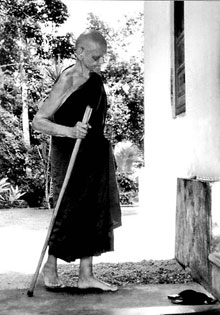| Plus |
|
|||
|
He
lived the life he preached Ven. Nanavimala Thera who was physically weak over a period of time, spent the last five years or so at Parappaduva in the Ratgama lagoon adjoining Polgasduwa, the island hermitage. I saw him four years ago at Parappaduva and though he was not keen to see visitors, when he saw a few children in our party, he called them to his bedside and preached 'metta'. He concentrated on meditation throughout his life as a monk. 'Anapana sati' was one of his main subjects of meditation. There had been occasions when he had enjoyed 'piti' - a sense of joy in meditative contemplation. Even when he was ill and would be brought from the island hermitage to Colombo in an ambulance, he would be in a state of 'samadhi' throughout the journey and would not even ask for a sip of water. The
monks who went to him for guidance found him a great teacher who
not only knew the Dhamma but could explain the finer points lucidly.
Along with many other German nationals, Moller was arrested by the British government and taken to a camp in Diyatalawa. The prisoners were moved to Dehra Dun in northwest India in 1942 and there he was housed in the same wing as Ven. Nanatiloka Thera, the first Buddhist monk from Europe who was residing in Sri Lanka and his German pupil Ven. Vappo Thera. He came to know them and developed an interest in Buddhism and soon became a devout Buddhist. After the war, when most of the Germans in Dehra Dun were repatriated to the British occupied region in Hamburg in November 1946, the Sinhalese Buddhists made representations and got back Ven. Nanatiloka Thera and other monks to Sri Lanka. Though keen to come back and become a monk, Moller was unable to do so and had to go to Hamburg. After working in a farm, he managed to get a job as an English teacher and was staying with a German lady who had lost her son in the war. Moller was treated as her own son. Having made contact with a Buddhist group in Hamburg, he once had to translate an English speech made by Asoka Weeraratne, the founder of the German Dharmadhuta Society in Colombo, into German. Weeraratne arranged for him to get back to Colombo which he did in June 1953 and began studying Buddhism earnestly. Having spent some time in the Forest Hermitage in Kandy and the Island Hermitage, he got ordained in September 1955. He was then 43. His spiritual teacher, Ven. Nanatiloka Thera passed him on to Ven. Nanaloka Thera who was in charge of the Island Hermitage. Two months after his ordination, he received higher ordination with Ven. Madihe Pannasiha Maha Nayaka Thera as his preceptor. He studied the Dhamma with Ven. Soma and Ven. Kheminda, two learned monks from Vajiraramaya who were then staying at the Island Hermitage. The new monk spent ten years at the island hermitage devoting himself mainly to meditation. In 1966, he began his charika moving from place to place throughout the country as a wandering monk strictly following the path laid down by the Buddha. He preferred not to stay in one place for more than three days and depended on 'pindapata' for his meals. As a 'homeless one', he would carry his alms bowl and the barest necessities in a small bag and walk barefoot. He had no fixed abode. Neither did he have a fixed destination. The story is told of a 'dayaka' who knew him at Vajiraramaya, meeting him one morning walking down Vajira road towards Galle road. When he politely asked him where he was going, Venerable Nanavimala had replied "I haven't decided yet. I will decide when I get to the end of the road". He would only spend the 'vassana' three months in one place. Most of the 'vassana' periods, he stayed in Saliyalena, a cave off Anuradhapura. For at least 25 years, if not more, he lived on 'pindapata'. It was only when he found his right hip wasting due to old age that he cut down on his walking. Yet one could see him using a helping stick and going on 'pindapata'. Paying a tribute to Ven. Nanavimala Thera in the BPS Newsletter, Bhikkhu Nyanatissa says: "When he met people Nanavimala would encourage them to practise the Dhamma with the Sutttas as a guide. Again and again he emphasized that the practice of the Dhamma, a simple renunciant lifestyle, and the giving up of all worldly attachments will lead one to the supreme bliss of Nibbana. His own renunciant lifestyle and mental wellbeing exemplified his advice to others. He inspired many younger monks and when he had the physical strength, was happy to give wise counsel to them on how to live the bhikkhu life to best advantage. One hesitates to say, "May he attain Nibbana!" since he might well have already done so, but since that is the tradition, let us add our voices to the chorus and say "May he attain Nibbana!" |
||||
Copyright © 2001 Wijeya Newspapers
Ltd. All rights reserved. |
 Two
weeks prior to his passing away, he stopped taking solids. He existed
on juices for one week thereafter and for two days he only took
water. A close associate attending on him during his last few hours
told me how he even felt the robe he was wearing making sure he
was dressed properly before closing his eyes for the last time.
Two
weeks prior to his passing away, he stopped taking solids. He existed
on juices for one week thereafter and for two days he only took
water. A close associate attending on him during his last few hours
told me how he even felt the robe he was wearing making sure he
was dressed properly before closing his eyes for the last time.